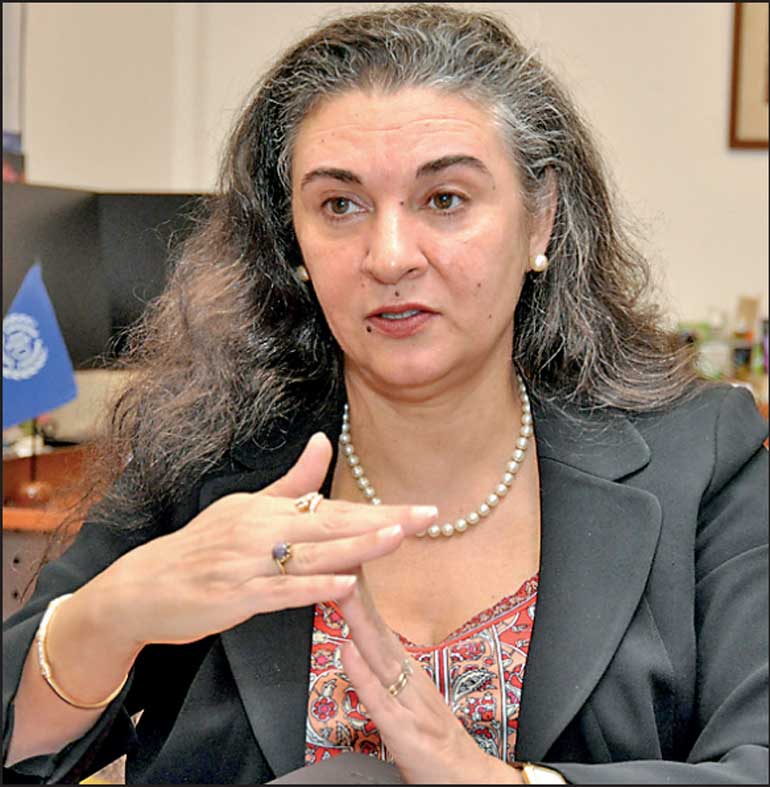Saturday Feb 21, 2026
Saturday Feb 21, 2026
Monday, 13 March 2023 00:20 - - {{hitsCtrl.values.hits}}

ILO Country Director for Sri Lanka and Maldives Simrin Singh - Pic by Lasantha Kumara
By Nisthar Cassim
The International Labour Organisation (ILO) is stressing the need for greater focus on “human-centred job-rich recovery” as a more sustainable path to emerge out of the crisis whilst fixing the external and internal finances of the country.
“We’re still in the economic crisis. It’s not gone. It’s going to stay with us for some years. The Micro, Small and Medium Enterprises (MSMEs) account for over 60% of the economy and the bulk of the employment comes from them. The job losses and the working hours lost were huge and certain segments have been much more disproportionately affected than others, obviously women and youth. These are ticking time bombs, especially the youth,” ILO Country Director for Sri Lanka and Maldives Simrin Singh told the Daily FT.
“We do have to move away from just the financial model. It has to be one that gives people the kind of protection because that’s the one thing we saw during the economic crisis that threw people off the edge was the complete, serious lack of adequate protections, whether it’s job security protections or health protections,” she recalled.
Unemployment rate in the country in the third quarter of last year had grown to 5% from 4.6% in the second quarter as per Central Bank data. Private sector estimates are much higher.
The ILO Country Chief also emphasised that the crisis has heralded a golden opportunity to fix many wrongs of the past or the inefficiencies. “Whilst the Government can have its negotiations with the IMF and the financial institutions and lenders and debtors, at the same time, it has to focus on how does a country recover from the human side,” said Singh, adding that people are the true asset of Sri Lanka.
“It is also time for proper workforce planning focusing on the MSMEs and services sectors. This will ensure a much better “human-centred job-rich” recovery pathway. “If people are leading a life of decent and dignified work, they can then offset vulnerabilities and demand the kind of protections needed from whether it’s a State or private employer,” Singh emphasised.
“If we invest in the right human-centred job-rich recovery policies that are really employment based for particular segments of the society, employees can actually benefit and get protection,” she added.
The ILO Sri Lanka office is working on a robust analysis of what has been the impact of the current economic crisis, especially on MSMEs that constitute the vast majority of workers and also the GDP of the country.
The upcoming report is following a publication last year on the impact of the labour market owing to multiple crises over the last 20 years including the north-east conflict and the COVID pandemic.
https://www.ilo.org/colombo/whatwedo/publications/WCMS_856157/lang--en/index.htm
According to Singh, Sri Lanka also needs to look at sectoral ecosystems. “We always felt tourism was a sector that had a lot of potential, not just for the jobs within hotels, but the entire ecosystem be it transport or food services. There’s still potential but it’s been a very volatile one. So, putting all your eggs into tourism in the box might not be the right thing, hence the need for proper diversification,” she explained.
“Looking at the assets of Sri Lanka, it’s people first of all, but also areas where it has a niche advantage to be invested in and investing in the MSME sector and accelerate entrepreneurship within the sector,” she said.
It was emphasised such a course is critical since the public sector cannot remain at a 20% workforce employment level, which is seriously high and should be around 4% level.
The other dilemma according to Singh is that the largest category in the public sector is those that are the lowest ones who are younger women at entry level jobs. “There’s a lot of areas in which the public sector can be made more efficient, which requires up-skilling among other measures,” she said adding greater focus on the MSMEs is critical especially given the cap on public sector hiring and placements.
The ILO Country Director observed that Sri Lankans are very intelligent and have lots of potential for the human workforce. “That’s a real asset. However, we need to not just think of it as an asset in terms of export but help the country actually become the niche and the hub.”
In this context, Singh suggests Sri Lanka needs to look at new ways in terms of how one invests in “virtual migration” which is instead of physically leaving the country, the workers still be here in Sri Lanka but earn and bring in the income by being employed by companies that are outside. “So virtual migration, especially for the skilled and high skilled jobs, has huge potential if workforce planning is done,” she added.